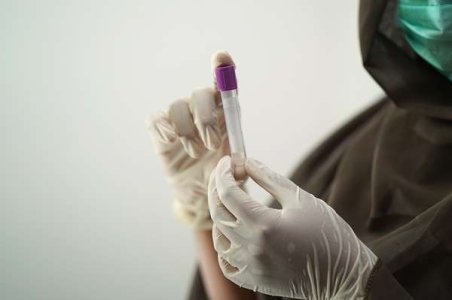This simple blood test could save your life–90% accurate in detecting colon cancer
By
Michelle E.
- Replies 0
In the quest to outsmart one of the most formidable foes of our health—colon cancer—scientists have made a groundbreaking stride that could revolutionize early detection and treatment.
Staying informed about advancements can significantly impact our well-being, especially as we age. That's why we're excited to share news of a simple blood test that boasts a 90% accuracy rate in detecting colon cancer, a silver lining in the fight against this pervasive disease.
Colon cancer, a silent predator, often goes unnoticed until it's too late. But what if a routine blood test could catch it in its tracks?
Researchers at New York University have developed an experimental blood test that could do just that. With an impressive 80% accuracy in detecting colon cancer compared to the traditional colonoscopy, this test is a game-changer.
The test works by identifying changes in DNA that signal the presence of cancer. It's not just about finding cancer; it's also about peace of mind.
The test was shown to be 90% accurate in confirming the absence of colon cancer among healthy individuals.

This level of precision is thanks to the innovative work of Freenome, a California-based biotech company, whose test could soon become one of the most reliable of its kind on the market.
Dr. Aasma Shaukat, the lead researcher, spoke to DailyMail.com about the transformative potential of this test.
She emphasized the importance of screening, noting that too many eligible individuals are currently not coming forward for colonoscopies.
This new test could encourage more people to get screened, catching cancer earlier and saving lives.
In a fascinating twist, researchers from the University of Sharjah in the United Arab Emirates have discovered that the common wormwood shrub, long used in traditional medicine, contains compounds that could effectively target and kill colorectal cancer cells.
This natural remedy seems to have a selective impact, attacking cancer cells while leaving healthy cells relatively unharmed.
To harness wormwood's potential, the plants were dried, ground into a fine powder, and used to create a methanol-based extract.
When tested against various types of colorectal cancer cells, the extract showed promising results, slowing cancer cell growth and halting the spread of certain proteins.
Dr. Lara Bou Malhab, the lead author of the study, highlighted, “Colorectal cancer is a common and serious illness, making it essential to find new and better treatments. Wormwood could be a promising natural ingredient for new cancer treatments based on our findings.”
The team's findings suggest that wormwood could be a promising natural ingredient for future cancer therapies, though further research is needed to fully understand its cancer-fighting properties.
Chemotherapy may also be done after surgery, with the treatment plans reaching around three to six months.
In 2024, the American Cancer Society reported over 150,000 new cases of colorectal cancer and approximately 53,000 deaths in the United States, making it the second leading cause of cancer-related deaths.
While rates among older adults have declined since 1985, early-onset colorectal cancer in younger individuals is on the rise.
The study that evaluated the new blood test included 40,000 participants aged 45 to 85, across 200 sites in the US.
The blood test confirmed cancer in 81% of cases detected by colonoscopy, showcasing its potential as a convenient and effective detection method. Dr Shaukat and her team say the blood test could be a “convenient” and “effective” method to detect colon cancer.
The American Cancer Society recommends adults start colonoscopy screenings at age 45 and continue every 10 years until age 75.
However, the simplicity and noninvasive nature of the blood test could make it an attractive alternative for many, especially those hesitant about the more invasive colonoscopy.
Until now, scientists are still trying to find out why the increase in colon cancer has occurred, but research is pointing to diets high in red meat, processed foods, and sugar could be the culprit. Researchers at the University of Florida are also looking at energy drinks that have taurine and how it could also cause colorectal cancer.

Also read: 44-year-old shares 5 subtle signs of colon cancer you might be ignoring right now
What are your thoughts on this new blood test and the potential of natural treatments like wormwood? Share your stories and insights in the comments below!
Staying informed about advancements can significantly impact our well-being, especially as we age. That's why we're excited to share news of a simple blood test that boasts a 90% accuracy rate in detecting colon cancer, a silver lining in the fight against this pervasive disease.
Colon cancer, a silent predator, often goes unnoticed until it's too late. But what if a routine blood test could catch it in its tracks?
Researchers at New York University have developed an experimental blood test that could do just that. With an impressive 80% accuracy in detecting colon cancer compared to the traditional colonoscopy, this test is a game-changer.
The test works by identifying changes in DNA that signal the presence of cancer. It's not just about finding cancer; it's also about peace of mind.
The test was shown to be 90% accurate in confirming the absence of colon cancer among healthy individuals.

A new blood test has been developed that can detect colon cancer with nearly 90% accuracy, offering a potential breakthrough in early diagnosis. Image source: Shameer Pk / Pixabay.
This level of precision is thanks to the innovative work of Freenome, a California-based biotech company, whose test could soon become one of the most reliable of its kind on the market.
Dr. Aasma Shaukat, the lead researcher, spoke to DailyMail.com about the transformative potential of this test.
She emphasized the importance of screening, noting that too many eligible individuals are currently not coming forward for colonoscopies.
This new test could encourage more people to get screened, catching cancer earlier and saving lives.
In a fascinating twist, researchers from the University of Sharjah in the United Arab Emirates have discovered that the common wormwood shrub, long used in traditional medicine, contains compounds that could effectively target and kill colorectal cancer cells.
This natural remedy seems to have a selective impact, attacking cancer cells while leaving healthy cells relatively unharmed.
To harness wormwood's potential, the plants were dried, ground into a fine powder, and used to create a methanol-based extract.
When tested against various types of colorectal cancer cells, the extract showed promising results, slowing cancer cell growth and halting the spread of certain proteins.
Dr. Lara Bou Malhab, the lead author of the study, highlighted, “Colorectal cancer is a common and serious illness, making it essential to find new and better treatments. Wormwood could be a promising natural ingredient for new cancer treatments based on our findings.”
The team's findings suggest that wormwood could be a promising natural ingredient for future cancer therapies, though further research is needed to fully understand its cancer-fighting properties.
Chemotherapy may also be done after surgery, with the treatment plans reaching around three to six months.
In 2024, the American Cancer Society reported over 150,000 new cases of colorectal cancer and approximately 53,000 deaths in the United States, making it the second leading cause of cancer-related deaths.
While rates among older adults have declined since 1985, early-onset colorectal cancer in younger individuals is on the rise.
The study that evaluated the new blood test included 40,000 participants aged 45 to 85, across 200 sites in the US.
The blood test confirmed cancer in 81% of cases detected by colonoscopy, showcasing its potential as a convenient and effective detection method. Dr Shaukat and her team say the blood test could be a “convenient” and “effective” method to detect colon cancer.
The American Cancer Society recommends adults start colonoscopy screenings at age 45 and continue every 10 years until age 75.
However, the simplicity and noninvasive nature of the blood test could make it an attractive alternative for many, especially those hesitant about the more invasive colonoscopy.
Until now, scientists are still trying to find out why the increase in colon cancer has occurred, but research is pointing to diets high in red meat, processed foods, and sugar could be the culprit. Researchers at the University of Florida are also looking at energy drinks that have taurine and how it could also cause colorectal cancer.
Key Takeaways
- A new blood test has been developed that can detect colon cancer with nearly 90% accuracy, offering a potential breakthrough in early diagnosis.
- The test, which looks for changes in DNA to indicate the presence of cancer, is also 90% effective at confirming the absence of colon cancer in healthy individuals.
- Researchers have also discovered that compounds from the common wormwood shrub could target and kill colorectal cancer cells while leaving healthy cells relatively unharmed.
- The blood test and potential new treatments offer hope for a more effective and less invasive approach to screening and battling colorectal cancer, especially as incidence rates in younger populations increase.
Also read: 44-year-old shares 5 subtle signs of colon cancer you might be ignoring right now
What are your thoughts on this new blood test and the potential of natural treatments like wormwood? Share your stories and insights in the comments below!





